北师大版(2019)选择性必修 第二册Unit 5 Education Lesson 3 Understanding 课件(共29张PPT)
文档属性
| 名称 | 北师大版(2019)选择性必修 第二册Unit 5 Education Lesson 3 Understanding 课件(共29张PPT) |
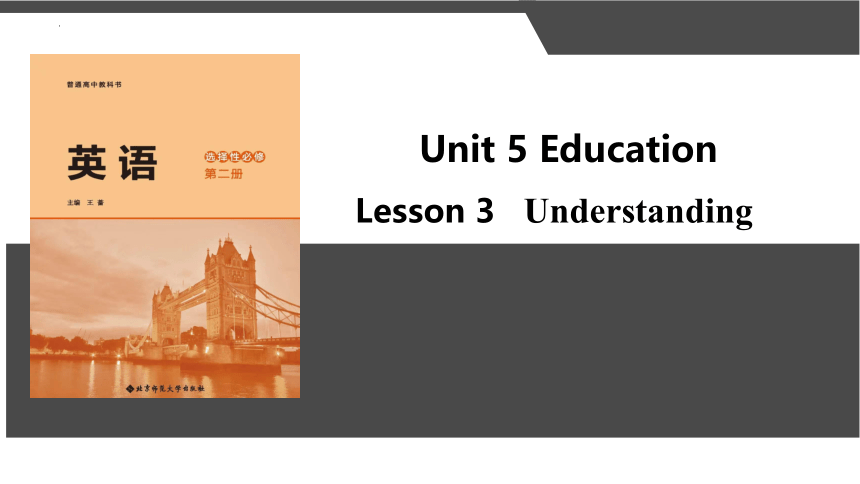
|
|
| 格式 | pptx | ||
| 文件大小 | 2.2MB | ||
| 资源类型 | 教案 | ||
| 版本资源 | 北师大版(2019) | ||
| 科目 | 英语 | ||
| 更新时间 | 2023-10-31 00:00:00 | ||
图片预览

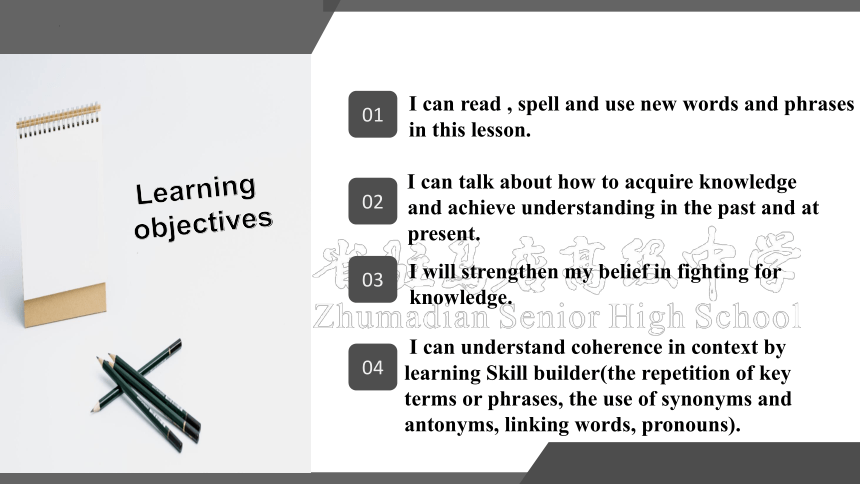
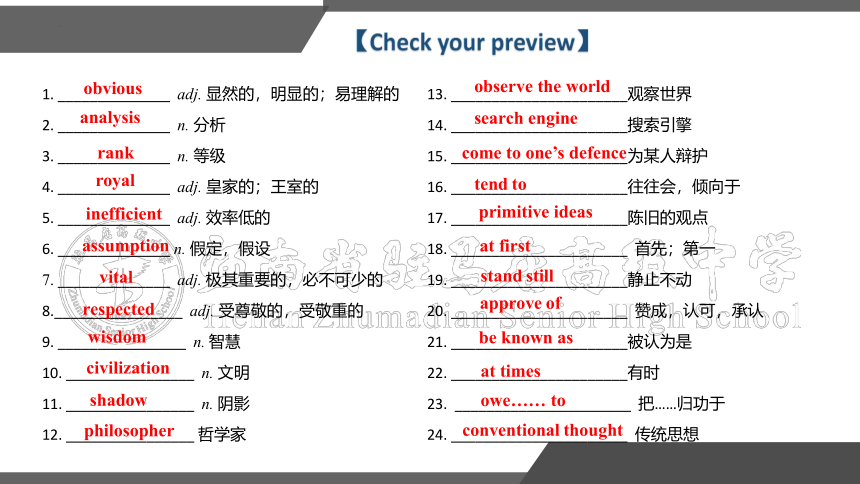
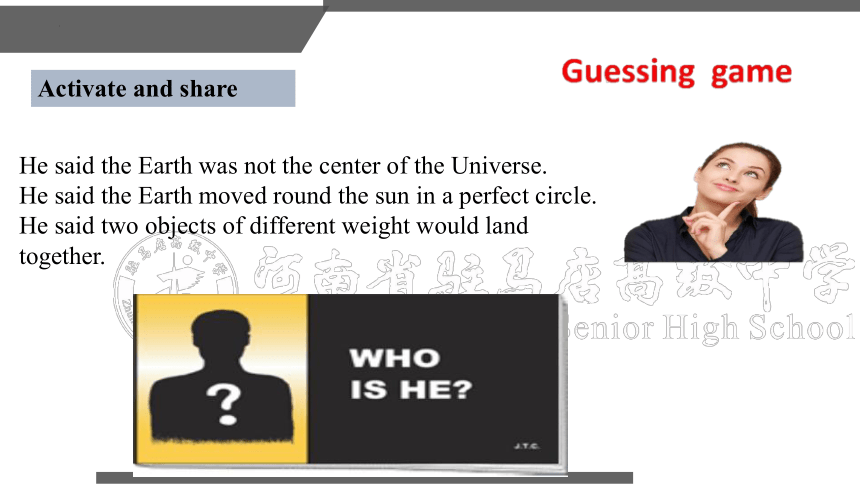
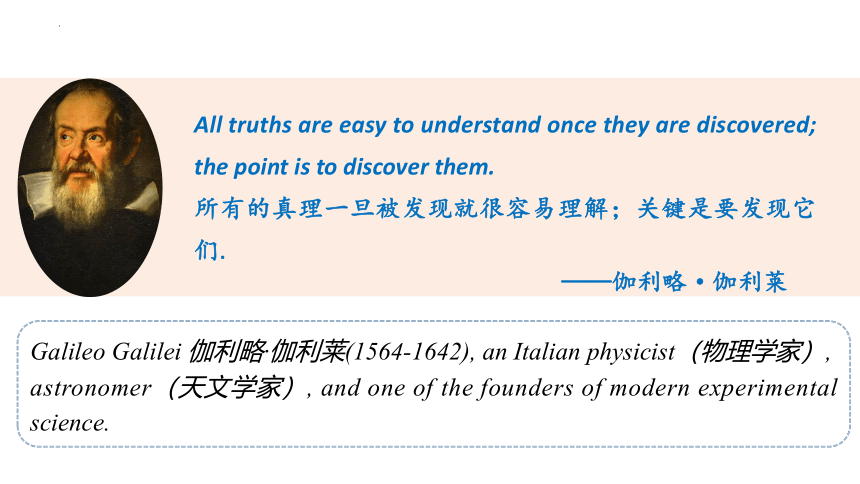
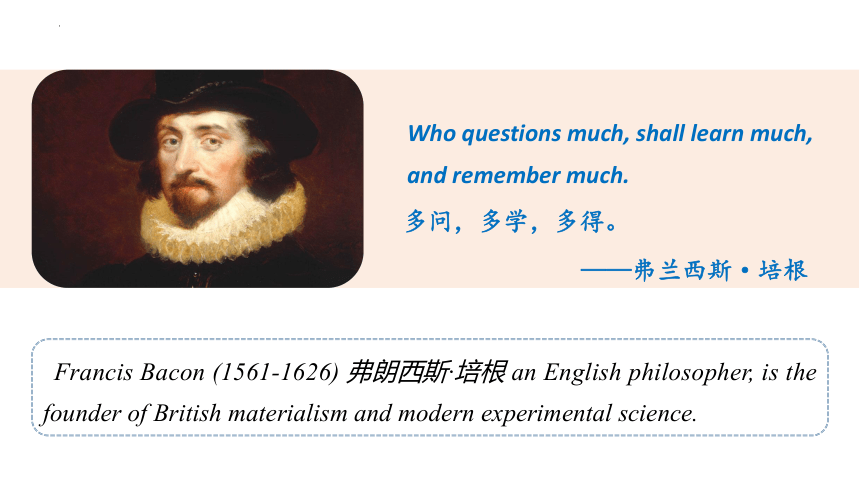
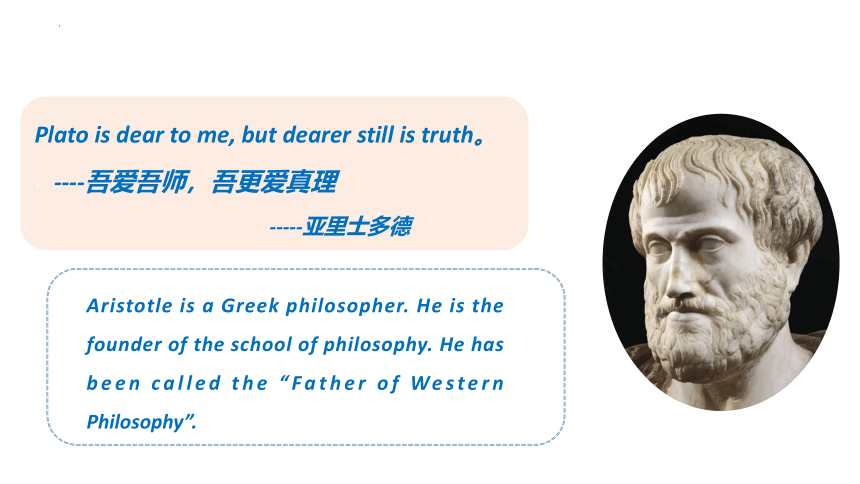

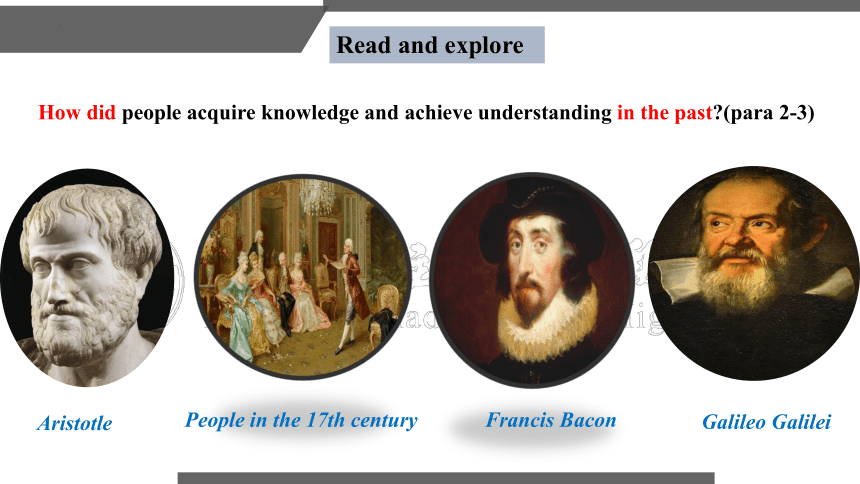
文档简介
(共29张PPT)
Unit 5 Education
Lesson 3 Understanding
Learning
objectives
01
02
03
04
I can read , spell and use new words and phrases
in this lesson.
I can talk about how to acquire knowledge and achieve understanding in the past and at present.
I will strengthen my belief in fighting for knowledge.
I can understand coherence in context by learning Skill builder(the repetition of key terms or phrases, the use of synonyms and antonyms, linking words, pronouns).
【Check your preview】
1. ______________ adj. 显然的,明显的;易理解的
2. ______________ n. 分析
3. ______________ n. 等级
4. ______________ adj. 皇家的;王室的
5. ______________ adj. 效率低的
6. ______________ n. 假定,假设
7. ______________ adj. 极其重要的,必不可少的
8.________________ adj. 受尊敬的,受敬重的
9. ________________ n. 智慧
10. ________________ n. 文明
11. ________________ n. 阴影
12. ________________ 哲学家
______________________观察世界
______________________搜索引擎
______________________为某人辩护
______________________往往会,倾向于
______________________陈旧的观点
______________________ 首先;第一
______________________静止不动
______________________ 赞成,认可,承认
______________________被认为是
______________________有时
______________________ 把……归功于
______________________ 传统思想
obvious
analysis
rank
royal
inefficient
assumption
vital
respected
civilization
wisdom
shadow
philosopher
observe the world
search engine
come to one’s defence
tend to
primitive ideas
at first
stand still
approve of
be known as
at times
owe…… to
conventional thought
Activate and share
He said the Earth was not the center of the Universe.
He said the Earth moved round the sun in a perfect circle.
He said two objects of different weight would land together.
Galileo Galilei 伽利略·伽利莱(1564-1642), an Italian physicist(物理学家), astronomer(天文学家), and one of the founders of modern experimental science.
——伽利略·伽利莱
All truths are easy to understand once they are discovered; the point is to discover them.
所有的真理一旦被发现就很容易理解;关键是要发现它们.
Francis Bacon (1561-1626) 弗朗西斯·培根 an English philosopher, is the founder of British materialism and modern experimental science.
Who questions much, shall learn much, and remember much.
——弗兰西斯·培根
多问,多学,多得。
Plato is dear to me, but dearer still is truth。
.
-----亚里士多德
Aristotle is a Greek philosopher. He is the founder of the school of philosophy. He has been called the “Father of Western Philosophy”.
----吾爱吾师,吾更爱真理
Read and explore
How do people acquire knowledge and achieve understanding now (para 1)
questions
observe the world around us and study the facts
consider possible answers and test each to find the right ones
How did people acquire knowledge and achieve understanding in the past (para 2-3)
Francis Bacon
Galileo Galilei
Aristotle
People in the 17th century
Read and explore
feeling
wrong
right
Why did they prefer the primitive ideas rather than truth
Primitive
Truth
mistakes
Read paragraph 4-5 and explore:
Q1: What should we do when acquiring knowledge
Q2: What attitude should we have towards the great man of the past Why
Galileo ends up under house arrest(软禁)
Read and explore
What do you think the last sentence of the passage means
These men knew that knowledge and understanding are things to fight for; more vital to a man, and more beneficial to mankind, some might say, than all the money in the world.
I think the last sentence of the text means that knowledge and understanding are more important than money. They are more helpful and useful because they can guide our ways of learning about the world and help us solve problems all the time while money can just buy certain goods and solve problems for some time.
Read and explore
Understanding Coherence in Context
Skill Builder
Read and explore
Coherence in a piece of writing refers to the principle that all paragraphs, sentences or ideas in it fit together so well that they form a united whole.
What is Coherence(连贯性)
Understanding Coherence in Context
Skill Builder
Read and explore
Yesterday morning, I went to a bookstore. All the foods on the shelf are very fresh and cheap. As my other took some beautiful pieces of furniture home. When I came out of the movie theatre, I found it had snowed in the afternoon.
昨天早上,我去了书店。架子上的所有食物都很新鲜和便宜。因为我妈带了很多漂亮的家具回家。当我走出电影院,我发现中午下雪了。
The importance of Coherence
An extreme example of an incoherent paragraph
Understanding Coherence in Context
Skill Builder
Read and explore
Useful cohesive devices
The repetition of key terms or phrases makes meaning coherent in a text.
The use of synonyms and antonyms helps enhance coherence in a text.
Linking words such as since, so, afterwards, then, although, but, however, etc. can help connect meanings in sentences.
Pronouns such as he, she, it, they, etc. help carry meaning on into the next point in a text.
Find out what each pronoun refers to in the text.
Example After that, we consider possible answers and test each to find the right ones. (Para.1) ones= answers
1. ... he was going against the views of the day. (Para. 2) he = ________________
2. This was certainly not the interest ...
(Para. 2) This = ___________________
3. ... what they had always comfortably believed. (Para. 2) they = ___________
_________________________________
the search for knowledge
Francis Bacon
the church and most people
4. … they grew angry and put him in prison (Para. 3) they = __________
5. … then it must be so. (Para. 3)
it = _____________
6. He is now known as … (Para. 3)
He = ___________
people
assumption
Galilei
Read and explore
It seems obvious now how we acquire knowledge and understanding. To start with, we need questions. Then, to find answers, we observe the world around us and study the facts. After that, we consider possible answers and test each to find the right ones. Although today we are more used to typing a few key words into a search engine and waiting for the Internet to give us an answer, modern scientists and thinkers are still solving the world’s problems with this type of analysis—luckily for us.
However, in the 17th century when Francis Bacon (1561-1626) suggested that this type of thinking was the way to gain knowledge, he was going against the views of the day. Although Bacon held an important rank in King James’ royal court of England, his true interest was not the day-to-day, slow and inefficient working style of the government, but the worthy search for knowledge. This was certainly not the interest of most people in his days. At that time, people believed more in the church than in facts, and people like Galileo Galilei (1564-1642), who proved the idea that “the Earth is not the centre of the universe”, were often punished by the church with no one coming to their.
Circle the linking words in the text that the writer used in order to express his / her opinion coherently.
Read and explore
The church and many people tended to ignore the facts and didn’t want to challenge what they had always comfortably believed. In fact, when Galilei proved that the Earth was not the centre of the universe, instead of believing him, people chose to believe views that were almost 2,000 years old!
It is not surprising that people wanted to believe these primitive ideas as they had been put forward by the great philosopher Aristotle (384-322 BCE). He said that the Earth must be the centre of the universe because it felt like the Earth was standing still. Galilei disagreed. At first, people approved of his studies and urged him to continue, but later when he proved Aristotle wrong, they grew angry and put him in prison. They didn’t want to abandon what they’d always thought as true. And this is still often true today. People make the assumption that if someone important and respected says that something is right, then it must be so. But even though Aristotle was a great man who inspired many great scientists and philosophers after him, he was wrong at times. And Galilei also made mistakes. He is now known as the father of astronomy but he believed that the Earth moved round the sun in a perfect circle. He was wrong.
Therefore, our understanding of the world around us is constantly growing and changing. In other words, we learn more every day and none of us can ever sit back and say, “We know it all.” We need to thank the great men of the past for their wisdom. They understood that we don’t know everything and probably never will, as this would mean a world with questions.
We owe so much of our knowledge and understanding of the world to people like Bacon and Galilei, who were brave enough to step out from the shadows of conventional thought in order to find the kingdom of knowledge that today’s civilisation is built upon. These men knew that knowledge and understanding are things to fight for; more vital to a man, and more beneficial to mankind, some might say, than all the money in the world.
In addition
Additionally
Besides
Apart from this
what’s more···
to begin with/initially
meanwhile, while, during,
then, after that, afterward(s), next ,
finally, at last,
【Homework】
Why did the writer write this passage Write down your answer and share in class.
Sentence analysis
1. However, in the 17th century when Francis Bacon suggested that this type of thinking was the way to gain knowledge, he was going against the views of the day.(para 2)
然而,在17世纪,当弗兰西斯.培根表示这种思考方式是获取知识的途径时,他背离了当时的观念。
e.g. His expression suggested that he was very tired.他的表情暗示出他很累。
She went against her mother’s wishes.
她违背了母亲的意愿。
时间状语从句
暗示,表明,其后的宾语从句用陈述语气
违背,与…不符
2. At that time, people believed more in religion than in facts and people like Galileo Galilei, who proved scientific ideas such as “the earth is not the centre of the universe”, were often punished by the church with no one coming to their defence. .(para 2)
那时,人们相信宗教多于相信事实,像伽利略.伽利莱那样证明了诸如“地球不是宇宙的中心”等科学观点的人常常被教会惩罚,却没有人为他们辩解。
并列句
共同修饰
with 复合结构, 作伴随状语
eg. The enemy came into a desperate situation with the boy leading the way.
3. We need to thank the great men of the past for the wisdom to know that we don’t know it all and probably never will, for that would mean a world without questions.
eg. He could not have seen me, for I was not there.
他不可能见过我,因为我不在那里。
我们要感谢历史上的伟人们,他们让我们懂得我们不是什么都懂,很可能将来也不会什么都懂,因为如果我们什么都懂,那将意味着世界上没有问题。
不定式短语作定语
for引导并列句,表原因
4. We owe so much of our knowledge and understanding of the world to people like Bacon and Galilei, who were brave enough to step out from the shadows of conventional thought in order to find the kingdom of knowledge that today’s civilization is built upon.
我们今天对世界拥有这么多的知识和理解,都要归功于培根和伽利略这样的人,为了发现开创现代文明的知识王国,他们勇敢地从传统思想的阴影中走出来。
共同修饰
目的状语
that引导的定语从句,修饰the kingdom of knowledge
1. Although Bacon held an important rank in King James’ royal court of England, his true interest was not the day- to – day, slow and inefficient working style of the government, but the worthy search for knowledge. (para 2)
Unit 5 Education
Lesson 3 Understanding
Learning
objectives
01
02
03
04
I can read , spell and use new words and phrases
in this lesson.
I can talk about how to acquire knowledge and achieve understanding in the past and at present.
I will strengthen my belief in fighting for knowledge.
I can understand coherence in context by learning Skill builder(the repetition of key terms or phrases, the use of synonyms and antonyms, linking words, pronouns).
【Check your preview】
1. ______________ adj. 显然的,明显的;易理解的
2. ______________ n. 分析
3. ______________ n. 等级
4. ______________ adj. 皇家的;王室的
5. ______________ adj. 效率低的
6. ______________ n. 假定,假设
7. ______________ adj. 极其重要的,必不可少的
8.________________ adj. 受尊敬的,受敬重的
9. ________________ n. 智慧
10. ________________ n. 文明
11. ________________ n. 阴影
12. ________________ 哲学家
______________________观察世界
______________________搜索引擎
______________________为某人辩护
______________________往往会,倾向于
______________________陈旧的观点
______________________ 首先;第一
______________________静止不动
______________________ 赞成,认可,承认
______________________被认为是
______________________有时
______________________ 把……归功于
______________________ 传统思想
obvious
analysis
rank
royal
inefficient
assumption
vital
respected
civilization
wisdom
shadow
philosopher
observe the world
search engine
come to one’s defence
tend to
primitive ideas
at first
stand still
approve of
be known as
at times
owe…… to
conventional thought
Activate and share
He said the Earth was not the center of the Universe.
He said the Earth moved round the sun in a perfect circle.
He said two objects of different weight would land together.
Galileo Galilei 伽利略·伽利莱(1564-1642), an Italian physicist(物理学家), astronomer(天文学家), and one of the founders of modern experimental science.
——伽利略·伽利莱
All truths are easy to understand once they are discovered; the point is to discover them.
所有的真理一旦被发现就很容易理解;关键是要发现它们.
Francis Bacon (1561-1626) 弗朗西斯·培根 an English philosopher, is the founder of British materialism and modern experimental science.
Who questions much, shall learn much, and remember much.
——弗兰西斯·培根
多问,多学,多得。
Plato is dear to me, but dearer still is truth。
.
-----亚里士多德
Aristotle is a Greek philosopher. He is the founder of the school of philosophy. He has been called the “Father of Western Philosophy”.
----吾爱吾师,吾更爱真理
Read and explore
How do people acquire knowledge and achieve understanding now (para 1)
questions
observe the world around us and study the facts
consider possible answers and test each to find the right ones
How did people acquire knowledge and achieve understanding in the past (para 2-3)
Francis Bacon
Galileo Galilei
Aristotle
People in the 17th century
Read and explore
feeling
wrong
right
Why did they prefer the primitive ideas rather than truth
Primitive
Truth
mistakes
Read paragraph 4-5 and explore:
Q1: What should we do when acquiring knowledge
Q2: What attitude should we have towards the great man of the past Why
Galileo ends up under house arrest(软禁)
Read and explore
What do you think the last sentence of the passage means
These men knew that knowledge and understanding are things to fight for; more vital to a man, and more beneficial to mankind, some might say, than all the money in the world.
I think the last sentence of the text means that knowledge and understanding are more important than money. They are more helpful and useful because they can guide our ways of learning about the world and help us solve problems all the time while money can just buy certain goods and solve problems for some time.
Read and explore
Understanding Coherence in Context
Skill Builder
Read and explore
Coherence in a piece of writing refers to the principle that all paragraphs, sentences or ideas in it fit together so well that they form a united whole.
What is Coherence(连贯性)
Understanding Coherence in Context
Skill Builder
Read and explore
Yesterday morning, I went to a bookstore. All the foods on the shelf are very fresh and cheap. As my other took some beautiful pieces of furniture home. When I came out of the movie theatre, I found it had snowed in the afternoon.
昨天早上,我去了书店。架子上的所有食物都很新鲜和便宜。因为我妈带了很多漂亮的家具回家。当我走出电影院,我发现中午下雪了。
The importance of Coherence
An extreme example of an incoherent paragraph
Understanding Coherence in Context
Skill Builder
Read and explore
Useful cohesive devices
The repetition of key terms or phrases makes meaning coherent in a text.
The use of synonyms and antonyms helps enhance coherence in a text.
Linking words such as since, so, afterwards, then, although, but, however, etc. can help connect meanings in sentences.
Pronouns such as he, she, it, they, etc. help carry meaning on into the next point in a text.
Find out what each pronoun refers to in the text.
Example After that, we consider possible answers and test each to find the right ones. (Para.1) ones= answers
1. ... he was going against the views of the day. (Para. 2) he = ________________
2. This was certainly not the interest ...
(Para. 2) This = ___________________
3. ... what they had always comfortably believed. (Para. 2) they = ___________
_________________________________
the search for knowledge
Francis Bacon
the church and most people
4. … they grew angry and put him in prison (Para. 3) they = __________
5. … then it must be so. (Para. 3)
it = _____________
6. He is now known as … (Para. 3)
He = ___________
people
assumption
Galilei
Read and explore
It seems obvious now how we acquire knowledge and understanding. To start with, we need questions. Then, to find answers, we observe the world around us and study the facts. After that, we consider possible answers and test each to find the right ones. Although today we are more used to typing a few key words into a search engine and waiting for the Internet to give us an answer, modern scientists and thinkers are still solving the world’s problems with this type of analysis—luckily for us.
However, in the 17th century when Francis Bacon (1561-1626) suggested that this type of thinking was the way to gain knowledge, he was going against the views of the day. Although Bacon held an important rank in King James’ royal court of England, his true interest was not the day-to-day, slow and inefficient working style of the government, but the worthy search for knowledge. This was certainly not the interest of most people in his days. At that time, people believed more in the church than in facts, and people like Galileo Galilei (1564-1642), who proved the idea that “the Earth is not the centre of the universe”, were often punished by the church with no one coming to their.
Circle the linking words in the text that the writer used in order to express his / her opinion coherently.
Read and explore
The church and many people tended to ignore the facts and didn’t want to challenge what they had always comfortably believed. In fact, when Galilei proved that the Earth was not the centre of the universe, instead of believing him, people chose to believe views that were almost 2,000 years old!
It is not surprising that people wanted to believe these primitive ideas as they had been put forward by the great philosopher Aristotle (384-322 BCE). He said that the Earth must be the centre of the universe because it felt like the Earth was standing still. Galilei disagreed. At first, people approved of his studies and urged him to continue, but later when he proved Aristotle wrong, they grew angry and put him in prison. They didn’t want to abandon what they’d always thought as true. And this is still often true today. People make the assumption that if someone important and respected says that something is right, then it must be so. But even though Aristotle was a great man who inspired many great scientists and philosophers after him, he was wrong at times. And Galilei also made mistakes. He is now known as the father of astronomy but he believed that the Earth moved round the sun in a perfect circle. He was wrong.
Therefore, our understanding of the world around us is constantly growing and changing. In other words, we learn more every day and none of us can ever sit back and say, “We know it all.” We need to thank the great men of the past for their wisdom. They understood that we don’t know everything and probably never will, as this would mean a world with questions.
We owe so much of our knowledge and understanding of the world to people like Bacon and Galilei, who were brave enough to step out from the shadows of conventional thought in order to find the kingdom of knowledge that today’s civilisation is built upon. These men knew that knowledge and understanding are things to fight for; more vital to a man, and more beneficial to mankind, some might say, than all the money in the world.
In addition
Additionally
Besides
Apart from this
what’s more···
to begin with/initially
meanwhile, while, during,
then, after that, afterward(s), next ,
finally, at last,
【Homework】
Why did the writer write this passage Write down your answer and share in class.
Sentence analysis
1. However, in the 17th century when Francis Bacon suggested that this type of thinking was the way to gain knowledge, he was going against the views of the day.(para 2)
然而,在17世纪,当弗兰西斯.培根表示这种思考方式是获取知识的途径时,他背离了当时的观念。
e.g. His expression suggested that he was very tired.他的表情暗示出他很累。
She went against her mother’s wishes.
她违背了母亲的意愿。
时间状语从句
暗示,表明,其后的宾语从句用陈述语气
违背,与…不符
2. At that time, people believed more in religion than in facts and people like Galileo Galilei, who proved scientific ideas such as “the earth is not the centre of the universe”, were often punished by the church with no one coming to their defence. .(para 2)
那时,人们相信宗教多于相信事实,像伽利略.伽利莱那样证明了诸如“地球不是宇宙的中心”等科学观点的人常常被教会惩罚,却没有人为他们辩解。
并列句
共同修饰
with 复合结构, 作伴随状语
eg. The enemy came into a desperate situation with the boy leading the way.
3. We need to thank the great men of the past for the wisdom to know that we don’t know it all and probably never will, for that would mean a world without questions.
eg. He could not have seen me, for I was not there.
他不可能见过我,因为我不在那里。
我们要感谢历史上的伟人们,他们让我们懂得我们不是什么都懂,很可能将来也不会什么都懂,因为如果我们什么都懂,那将意味着世界上没有问题。
不定式短语作定语
for引导并列句,表原因
4. We owe so much of our knowledge and understanding of the world to people like Bacon and Galilei, who were brave enough to step out from the shadows of conventional thought in order to find the kingdom of knowledge that today’s civilization is built upon.
我们今天对世界拥有这么多的知识和理解,都要归功于培根和伽利略这样的人,为了发现开创现代文明的知识王国,他们勇敢地从传统思想的阴影中走出来。
共同修饰
目的状语
that引导的定语从句,修饰the kingdom of knowledge
1. Although Bacon held an important rank in King James’ royal court of England, his true interest was not the day- to – day, slow and inefficient working style of the government, but the worthy search for knowledge. (para 2)
同课章节目录
- Unit 4 Humour
- Lesson 1 What’s So Funny?
- Lesson 2 Why Do We Need Humour?
- Lesson 3 My Favourite Comedian
- Unit 5 Education
- Lesson 1 Enlightening a Mind
- Lesson 2 The Objectives of Education
- Lesson 3 Understanding
- Unit 6 The Media
- Lesson 1 From Page to Screen
- Lesson 2 Questions about Media
- Lesson 3 The Advertising Game
